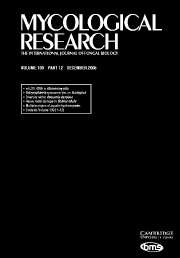Crossref Citations
This article has been cited by the following publications. This list is generated based on data provided by
Crossref.
Frazer, Lilyann Novak
1998.
One stop mycology.
Mycological Research,
Vol. 102,
Issue. 12,
p.
1571.
Furlaneto, Marcia Cristina
Gonzalez Paião, Fernanda
Gisele da S. Pinto, Fabiana
and
Fungaro, Maria Helena Pelegrinelli
1999.
Transformation of the entomopathogenic fungusMetarhizium flavovirideto high resistance to benomyl.
Canadian Journal of Microbiology,
Vol. 45,
Issue. 10,
p.
875.
Thomas, Matthew B.
1999.
Ecological approaches and the development of “truly integrated” pest management.
Proceedings of the National Academy of Sciences,
Vol. 96,
Issue. 11,
p.
5944.
Moore, David
Lord, Jeffrey C.
and
Smith, Susan M.
2000.
Alternatives to Pesticides in Stored-Product IPM.
p.
193.
Blanford, Simon
Thomas, Matthew B.
and
Langewald, Jürgen
2000.
Thermal ecology of Zonocerus variegatus and its effects on biocontrol using pathogens.
Agricultural and Forest Entomology,
Vol. 2,
Issue. 1,
p.
3.
Blanford, S.
and
Thomas, M. B.
2000.
Thermal Behavior of Two Acridid Species: Effects of Habitat and Season on Body Temperature and the Potential Impact on Biocontrol with Pathogens.
Environmental Entomology,
Vol. 29,
Issue. 5,
p.
1060.
Arthurs, Steve
and
Thomas, Matthew B.
2000.
Effects of a Mycoinsecticide on Feeding and Fecundity of the Brown Locust Locustana pardalina.
Biocontrol Science and Technology,
Vol. 10,
Issue. 3,
p.
321.
Arthurs, Steven
and
Thomas, Matthew B
2001.
Effects of Temperature and Relative Humidity on Sporulation of Metarhizium anisopliae var. acridum in Mycosed Cadavers of Schistocerca gregaria.
Journal of Invertebrate Pathology,
Vol. 78,
Issue. 2,
p.
59.
Lomer, C. J.
Bateman, R. P.
Johnson, D. L.
Langewald, J.
and
Thomas, M.
2001.
BIOLOGICAL CONTROL OF LOCUSTS AND GRASSHOPPERS.
Annual Review of Entomology,
Vol. 46,
Issue. 1,
p.
667.
Arthurs, Steven
and
Thomas, Matthew B.
2001.
Behavioural changes in Schistocerca gregaria following infection with a fungal pathogen: implications for susceptibility to predation.
Ecological Entomology,
Vol. 26,
Issue. 3,
p.
227.
Blanford, Simon
and
Thomas, Matthew B
2001.
Adult Survival, Maturation, and Reproduction of the Desert Locust Schistocerca gregaria Infected with the Fungus Metarhizium anisopliae var acridum.
Journal of Invertebrate Pathology,
Vol. 78,
Issue. 1,
p.
1.
Ouedraogo, Robert M
Kamp, Andrena
Goettel, Mark S
Brodeur, Jacques
and
Bidochka, Michael J
2002.
Attenuation of fungal infection in thermoregulating Locusta migratoria is accompanied by changes in hemolymph proteins.
Journal of Invertebrate Pathology,
Vol. 81,
Issue. 1,
p.
19.
Frid, Leonardo
and
Myers, Judith H.
2002.
Thermal ecology of western tent caterpillars Malacosoma californicum pluviale and infection by nucleopolyhedrovirus.
Ecological Entomology,
Vol. 27,
Issue. 6,
p.
665.
Elliot, Sam L.
Blanford, Simon
and
Thomas, Matthew B.
2002.
Host–pathogen interactions in a varying environment: temperature, behavioural fever and fitness.
Proceedings of the Royal Society of London. Series B: Biological Sciences,
Vol. 269,
Issue. 1500,
p.
1599.
Stacey, David A.
Thomas, Matthew B.
Blanford, Simon
Pell, Judith K.
Pugh, Clare
and
Fellowes, Mark D. E.
2003.
Genotype and temperature influence pea aphid resistance to a fungal entomopathogen.
Physiological Entomology,
Vol. 28,
Issue. 2,
p.
75.
Ouedraogo, Robert M.
Cusson, Michel
Goettel, Mark S.
and
Brodeur, Jacques
2003.
Inhibition of fungal growth in thermoregulating locusts, Locusta migratoria, infected by the fungus Metarhizium anisopliae var acridum.
Journal of Invertebrate Pathology,
Vol. 82,
Issue. 2,
p.
103.
Davidson, G.
Phelps, K.
Sunderland, K.D.
Pell, J.K.
Ball, B.V.
Shaw, K.E.
and
Chandler, D.
2003.
Study of temperature-growth interactions of entomopathogenic fungi with potential for control of Varroa destructor (Acari: Mesostigmata) using a nonlinear model of poikilotherm development.
Journal of Applied Microbiology,
Vol. 94,
Issue. 5,
p.
816.
Liu, Houping
Skinner, Margaret
Brownbridge, Michael
and
Parker, Bruce L
2003.
Characterization of Beauveria bassiana and Metarhizium anisopliae isolates for management of tarnished plant bug, Lygus lineolaris (Hemiptera: Miridae).
Journal of Invertebrate Pathology,
Vol. 82,
Issue. 3,
p.
139.
Roberts, Donald W.
and
St. Leger, Raymond J.
2004.
Vol. 54,
Issue. ,
p.
1.
Rangel, Drauzio E.N.
Braga, Gilberto U.L.
Anderson, Anne J.
and
Roberts, Donald W.
2005.
Variability in conidial thermotolerance of Metarhizium anisopliae isolates from different geographic origins.
Journal of Invertebrate Pathology,
Vol. 88,
Issue. 2,
p.
116.


